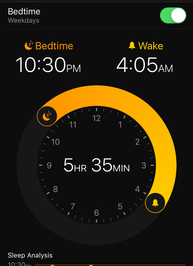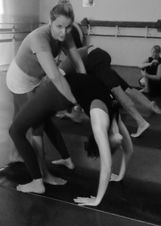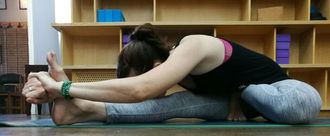|
Your breath can be used as a powerful tool to anchor you into the present moment. Focusing on your breathing can also be used to take your attention away from a stressful moment, fearful thought or anxious event. Bringing your awareness to your breath has the ability to calm the mind, center the body and alleviate your stress. Enjoy this breath meditation first thing in the morning to start your day off right, as a relaxing break throughout the day or at night to help the body decompress and prepare for sleep.
4 Comments
Hopefully, I am not alone in my love for Ashtanga. I really do adore it and I know it has changed my life in so many ways. Each year, on Febrary 23rd, I celebrate my ashtangaversary. It is, of course, the anniversary of my first ashtanga class. Thanks to Facebook, I have a short record of my 6 years of ashtanga and today I thought I'd share a bit of my journey.
The Popliteus Muscle and its Role in Yoga Postures and Movement
 Many years ago, I was a swimmer, I swam in high school for my team and I really enjoyed it, but I wasn’t all that good. I didn’t quite get that competitive swimming was different than recreational swimming when I first joined the team, but nonetheless, I did my best. My best was not awesome. For anyone in the know, my breast stroke time was as fast as my freestyle (this might be good if either of my times were fast, but I had an average breast stroke time and a horrible freestyle time). My coach wanted to help me get better at my freestyle technique, so he videotaped me swimming (no easy feat in the early 90s) and it was rough. I was all over the place and really awkwardly uneven. My coach had been trying to convince me that I should breathe every 3 strokes in an attempt to even out my stroke, my haphazard movement, but it wasn’t until I saw that video that I knew I needed to do something to change how I went about swimming freestyle. When I started to breath every 3 strokes, it felt really uncomfortable, but the next time I was videotaped, by stroke looked a million times better than it did before. By breathing every 3 strokes, my body had evened itself out and I had a better balance as I swam.  Nobody believes I wake up at three. I woke up at 7:00 AM ish until I was 10, then 5:30 AM until I was 14, and I have been getting up at 3:00 AM for the last three months. When I was 10 and started waking up earlier than most people. I had the typical hatred towards waking up early, but I eventually learned how to like waking up. I set an alarm. I made it easier by getting a ringtone app. I made my wake up alarm fun, so that way I could look forward to it. I like bragging about waking up early. I read and heard about how waking up at the same time every day is beneficial, so while everyone else I know sleeps in on weekends, holidays, moon days, and breaks, I prefer to wake up at my usual time. I get to yoga at about 5:00 AM, so why, you may ask, do I get up at 3:00 AM? I function best in the morning, when everyone else is asleep, quiet, and not bothering me. This means that I can pray, read the bible, go for run, do my homework, and prepare for the chaos of the day at 3:00. Getting up at 3:00 is fun. I naturally wake up at 3:00 AM. whether or not my alarm goes off, or was set in the first place. When I am on vacation, at a sleepaway camp, or sleeping over at a friends house, I don’t set the alarm but sit there awake from 3:00 AM, until everyone else wakes up. Is waking up early difficult or you? Maybe a yoga practice would work in your routine. -Corrine  Lately I've been distracted. I think I am really just stressed out. I have a lot to do for work and I keep falling behind. In fact, instead of grading the 63 essays that have been waiting for me for over a week, I'm writing this blog. I know I am doing it to myself, but I can't stop putting it off. I will be at parent/teacher conferences for many hours today, so my goal is to get started on the pile, and as soon as I am done writing this I think I officially run out of things I can do to avoid the grading. One this I don't procrastinate over is my practice. I come every day, pretty much without fail. I am glad I am unwilling to put it off, but lately, I've been very distracted. I keep forgetting poses in 1st series which I have been doing for over 5 years. I will get to a point and realize that I skipped over some pose, and sometimes it is one I love. I first noticed this the day I forgot garbha pidasana. I love that pose, but I got to the very end, and did my jump back out of padmasana and realized it was the first time I had done that. I had simply forgotten the pose and since then, I feel like I have forgotten a pose each and every day. Sometimes I remember the poses, but I find myself sucked into someone else's adjustment or feedback. The other day I was saying the closing chant and the teacher said something quietly and I forgot where I was. It is getting pretty ridiculous.  I have this voice inside my head. Sometimes it tells me the truth, but sometimes it lies to me. Sometimes, this voice tells me that I am doing a good job, that I am learning new things, that I am doing life right, but other times, it tricks me. It whispers all my old doubts in my ear and makes me believe I can’t do things. I try to ignore it, but sometimes it wins, even though I wish it didn’t.  My actual alarm. Sometimes I go to bed early, but yes, I know I don't get enough sleep. My actual alarm. Sometimes I go to bed early, but yes, I know I don't get enough sleep. Confession #1 I hate mornings. I loathe them. I am not a morning person. When I get to work (after my practice) I’m often still cranky. However, I get up at roughly 4 am each weekday so that I can practice before I go to work, and I’ll start getting up earlier if I get more poses and my practice takes longer than it is currently. But I don’t like it. I set many alarms. I have a sunrise alarm clock that goes off at 4am, and a back up on my cell phone set for 4:05, and sometimes I still hit snooze. I get up and come every day, but that first 10 minutes is the worst. I hate it, but I do it, because I hate how I feel when I don’t practice more. One of my favorite things about yoga, especially ashtanga yoga, is seeing my own growth. Because we do the same thing every day, I can tell day to day how a pose is changing and feeling different. I can actually feel things changing. Some times, this happens without any help and instruction, but 9 times out of 10 a teacher will say something to me, something that I have probably heard before more often than not, but it just clicks and like magic, things change. My hope with this series is to share one of my favorite tips from some of my favorite teachers because maybe it will be the right time for you too!  Looking back with a wonderful assist from Susan! Looking back with a wonderful assist from Susan! So, to get us started, I'm going to start with my most recent favorite tip. To be completely honest, I have a bit of a love/hate (a lot of the time it is mostly hate) relationship with back bends. They hurt for years, frustrated me when they stopped hurting, and they still make my heart race. I recently learned how to drop back and stand up, and most importantly stand up from urdhva dhanurasana. It is all so hard, but I love that it is starting to click.  I'll admit it, I love poses that most people hate. I get some kind of weird pleasure from these poses. One of my absolute favorites is janu sirsasana C. I have always been able to do some approximation of the pose, but it has really developed over time. When I first learned the pose a little over six years ago, my foot felt a sharp pain in the toes and my knee wouldn't go to the ground. I remember the first time Scott Page looked over at me and told me my knee should go to the ground; I couldn't wrap my head around how that was even possible. As time passed, I started to figure out some tricks to the pose and it is those tricks that have made it one of my favorites. |
About UsWe are a community of Ashtanga yoga practitioners who blog about the things we love.
Archives
January 2022
Categories
All
|
|


 RSS Feed
RSS Feed
